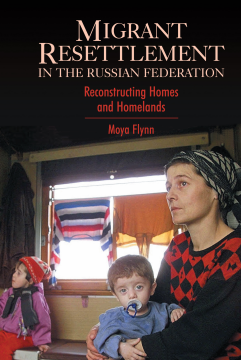
Additional Information
Book Details
Abstract
Following the collapse of the USSR in 1991 and the rapid political, social and economic change that ensued, widespread population movements took place across the former territory of the Soviet Union. 'Migrant Resettlement in the Russian Federation' offers a new perspective on one of the most significant movements - the ethnic Russian and Russian-speaking population moving from Soviet successor states to the Russian Federation. While the substantial domestic and foreign policy implications of this migration movement have been recognized, there has to date been little exploration of another crucial aspect of this phenomenon: the micro-level sociocultural experiences and implications of movement and resettlement, and the nature of migrant response.
Based on original empirical data collected by the author, this timely book offers a unique insight into the individual and collective experiences of movement and resettlement among Russian migrants 'returning' to the Russian Federation over the period 1991–2002. Moya Flynn uses different levels of analysis (local, regional, national and global) to open up fresh perspectives on the nature of the Russian migration regime and government migration policy. The book offers the first in-depth examination of non-governmental development in the area of migration in post-Soviet Russia and provides new understandings of the experience of migration and resettlement at the individual level, specifically through an exploration of understandings of 'home' and 'homeland' and a focus on the role of migrant networks.
'Migrant Resettlement in the Russian Federation' is a major new contribution to current debates in migration studies. Its unique synthesis of original theoretical and empirical material will appeal to students of contemporary Russian politics, geography, culture and society, academics and policymakers alike.
'An original empirical and theoretical contribution, both to Russian studies and more generally to migration studies… A mine of original and interesting material.' —Khalid Koser, Lecturer in Human Geography, University College London
This timely book offers a unique insight into the individual and collective experiences of movement and resettlement among Russian migrants 'returning' to the Russian Federation over the period 1991–2002. Moya Flynn uses different levels of analysis (local, regional, national and global) to open up fresh perspectives on the nature of the Russian migration regime and government migration policy. The book offers the first in-depth examination of non-governmental development in the area of migration in post-Soviet Russia and provides new understandings of the experience of migration and resettlement at the individual level, specifically through an exploration of understandings of 'home' and 'homeland' and a focus on the role of migrant networks.
Moya Flynn is a Lecturer in the Department of Central and East European Studies at the University of Glasgow, UK. Her main research interest concerns the migration movements taking place in the Russian Federation and the wider post-Soviet space.
'Coherent, innovative...important new research [and] impressive quantity and quality of data... Its conclusions challenge existing assumptions that can influence thinking about Russia.' —Wendy Slater, Lecturer in Contemporary Russian History, School of Slavonic and East European Studies, University College London
Table of Contents
| Section Title | Page | Action | Price |
|---|---|---|---|
| Cover | 1 | ||
| Front Matter\r | 2 | ||
| Half Title\r | 2 | ||
| Title\r | 4 | ||
| Copyright\r | 5 | ||
| Contents\r | 6 | ||
| List of Tables, Figures and Maps\r | 7 | ||
| Acknowledgements\r | 8 | ||
| Main Body\r | 10 | ||
| Introduction\r | 10 | ||
| Chapter 1. Understanding Migration in Post-Soviet Russia\r | 18 | ||
| Chapter 2. Constructions of the 'Homeland' by the Russian State\r | 43 | ||
| Chapter 3. Leaving 'Home' and 'Homeland'? The Decision to Migrate\r | 64 | ||
| Chapter 4. 'Return' and Resettlement: Recognition Within the Russian State\r | 86 | ||
| Chapter 5. The Development Non-governmental Sector\r | 111 | ||
| Chapter 6. Depending on 'Selves': Family, Friendship and Migrant Networks\r | 134 | ||
| Chapter 7. Conclusion: Reconstructing Immediate 'Homes' and Future 'Homelands'\r | 156 | ||
| End Matter\r | 168 | ||
| Appendix 1. Limitations of Statistics Concerning Forced Migrants and Refugees\r | 168 | ||
| Appendix 2. Migrant Settlement Sites in Saratow, Samara and Novosibirsk 'Oblasti'\r | 171 | ||
| Appendix 3. Table of Migrant Socio-demographic Data\r | 179 | ||
| Appendix 4. Profiles of Federal Non-governmental Organizations and Regional Migrant Organizations\r | 187 | ||
| Notes\r | 194 | ||
| Notes: Introduction\r | 194 | ||
| Notes: Chapter 1\r | 195 | ||
| Notes: Chapter 2\r | 201 | ||
| Notes: Chapter 3\r | 208 | ||
| Notes: Chapter 4\r | 211 | ||
| Notes: Chapter 5\r | 218 | ||
| Notes: Chapter 6\r | 224 | ||
| Notes: Chapter 7\r | 228 | ||
| Bibliography\r | 232 | ||
| Index\r | 248 |
